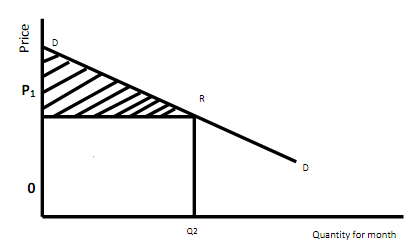Consumer's Surplus:
The term consumer's surplus refers to the difference between what the consumer would be willing to pay to purchase a given quantity of a commodity and what he actually pays for this quantity rather than forgo it. It arises because the consumer pays for all units of the commodity the price he is just willing to pay for the last unit (Qn) purchased, whereas the marginal utility on each of earlier units is greater and on those units the consumer is willing to pay prices higher than P1

In Figure, the consumer's surplus is represented by the area of the shaded Triangle P1RD